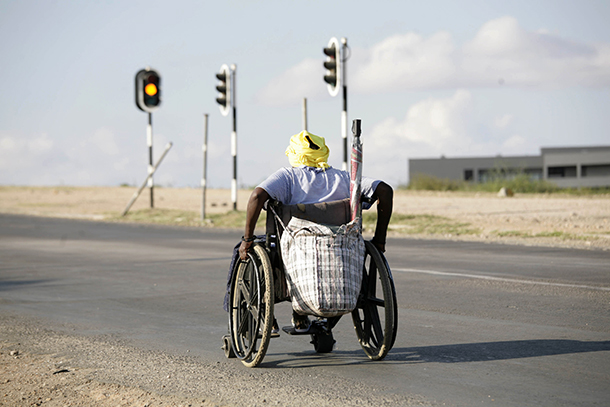
By KENNETH NYANGANI/ Farai Matiashe
People living with disabilities (PLWDs) have raised concerns over access to services in education, health, justice and transport sectors.
This came after the government put in place policies to ensure PLWDs get access to these services free of charge. But due to corruption, they are made to pay for access to health at local clinics, toilets in public places and school fees even at government-run schools.
Speaking at a community peace and lobby initiative organised by the Centre for Conflict Management and Transformation (CCMT) in Epworth on Thursday, Mary Maphosa, who is living with disabilities, alleged they were being harassed by nurses at local clinics.
“I have this condition. When I went to the clinic to deliver my baby, I was shocked to be told I was bothering the nurses. They asked me why on earth a PLWD would become pregnant. They also asked for payments, yet I did not have,” she said.
Junet Banda, founder of Yamuranai Association of PLWDs and a parent to a child living with disabilities, said she was having challenges with her child at Epworth Primary School.
“My child learns at Epworth Primary and is in special class. She has cerebral pulse. The Primary and Secondary Education ministry told me that all children in the special class are not supposed to pay fees because of their condition. But at that school, I am paying. They asked me to pay,” she said.
PLWDs also revealed that transport system in the country was discriminatory to them.
- Chamisa under fire over US$120K donation
- Mavhunga puts DeMbare into Chibuku quarterfinals
- Pension funds bet on Cabora Bassa oilfields
- Councils defy govt fire tender directive
Keep Reading
Zimbabwe’s economy is deteriorating and the cost of commuting has gone beyond the reach of many and the government responded by introducing Zupco buses as the mass transportation system, but PLWDs cannot stand the pressure to board those buses.
Epworth Residents Development Association secretary-general Peter Nyapetwa said PLWDs were facing problems in the education sector.
“Teachers usually do not appreciate PLWDs. Some PLWDs are being denied access to education. They say they cannot handle such children,” he said.
Nyapetwa said most PLWDs relied on informal trading, but they were being harassed by both municipal police and law enforcement agents. Epworth ward 1 councillor Joshua Chinonyengerwa said there was need to educate and raise awareness on council employees, particularly nurses in order to equip them with skills and knowledge on how to handle PLWDs.
CCMT project officer Alethea Chinowaita said they were going to take up their grievances.
“We want peace-building processes to be inclusive. The marginalised, including PLWDs, are usually left out yet they are the ones who are affected more when there is a conflict. These communities are our major stakeholders when it comes to peace-building. As CCMT, we will play a facilitative role, that is, we are going to take their grievances to relevant stakeholders. We will also link them to certain organisations so that they can be assisted in terms of their thematic concerns,” she said.
Meanwhile, United Nations Development Programme country programme specialist Tafadzwa Muvingi said there was a tendency by some families to hide family members living with a disability.
Addressing PLWDs in Cyclone Idai-hit Chimanimani areas recently, following a five-day United Nations workshop on the Rights of Persons with Disability in Mutare, Muvingi said there was need to raise awareness on disability issues at family level before they are forwarded to government.
“The issue of disability should be solved at family level first because we have realised that some families don’t accept disability in their families and this should be addressed at all cost,” she said.
“Some families hide their members with disabilities and we need to raise awareness at family level. I want to urge the government that when introducing their programmes, we should think of those disabled first.”
Chimanimani Disability Group ward 15 chairman Tapiwa Sigauke said Cyclone Idai had affected PLWDs at a massive scale.
“I think we were the most affected people. We now have many people living with disabilities after Cyclone Idai. We need help from the government in the form of projects so that we sell agricultural inputs,” she said.
Chief Ngorima said he was happy with the government’s intervention after the Cyclone Idai.
“So far, we are happy with the government’s intervention in helping people with disabilities after Cyclone Idai,” he said.











